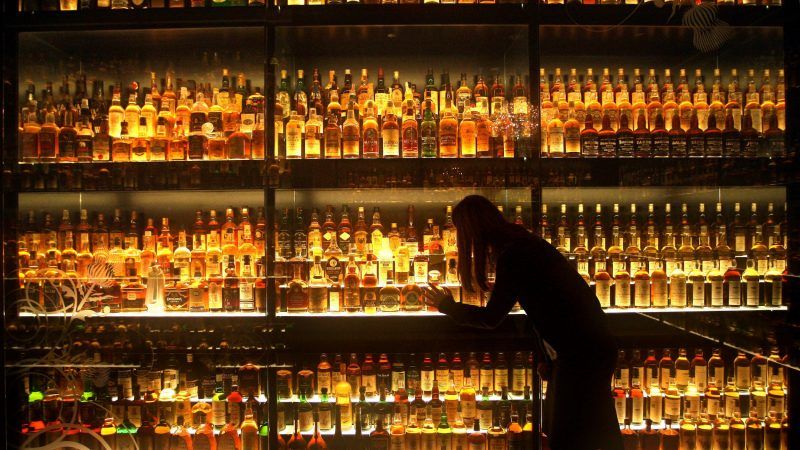Scotch Whisky Makers Don't Want a Virginia Distillery Using the Word 'Whisky'
What's in a name? Money, apparently.

Last week a Scottish whisky association filed suit against a U.S.-based distiller over the latter's use of the Scottish terms "whisky" and "Highland" on its labels. The suit was filed by the Scotch Whisky Association (SWA), a Scottish trade group that represents more than 9 out of every 10 of the world's Scotch Whisky makers.
The SWA lawsuit, filed in U.S. District Court in Delaware, alleges the Virginia Distillery Company's use of the term "Virginia-Highland Whisky" is false, misleading, and deceptive. Among its claims, the SWA alleges that Virginia Distillery Company's marketing violates the Lanham Act, a law that governs trademarks and which I discussed at some length in a 2014 column.
"Defendant's prominent use of the term 'Highland' and its spelling of 'Whisky,' among other things, falsely indicates to the public that Defendant's product is Scotch Whisky when it is not, and/or that it is whisky that originates in Scotland, which it does not," the lawsuit states.
In a statement issued in the wake of the lawsuit, Virginia Distillery Company CEO Gareth A. Moore defended the company's labeling and marketing.
"Our label clearly indicates the source of our whisky, stating 'Whisky from Scotland, Married with Virginia Whisky,'" Moore writes of the company's blend, "and we have always been upfront in descriptions to our customers."
Any differences between whisky and whiskey (or Scotch, bourbon, rye, and other similarly distilled spirits) boil down largely to geographic and legal standards. "American-made and Irish-made spirits are traditionally spelled 'whiskey' while 'whisky' is used primarily in Scotland, England, Wales, Canada, Australia, and New Zealand and most areas of the United Kingdom," a Daily Progress piece on the litigation explains.
The SWA acts as something of a protector of the realm, seeking "to sustain Scotch Whisky's place as the world's leading high-quality spirit drink." The group pursues this goal by "protect[ing] Scotch Whisky from those who want to take advantage of its popularity by selling fake Scotch or trading unfairly on its reputation." (The SWA also creates clever videos such as this one, which blends humor, Neil Diamond, and a wee dram of xenophobia to make its point that Scotch should only be made in Scotland.)
The SWA has gone after allegedly fake whisky makers for decades. A Whisky Advocate piece notes that whisky giant Dewar's—itself an SWA member—ran afoul of the SWA several years ago by marketing a honey-infused whisky. The SWA alleged the product's labeling—which included an accurate description of the bottle's contents: "Dewar's Blended Scotch Whisky Infused With Natural Flavors"—should not use the term "whisky" because U.K. rules don't allow for the addition of anything to Scotch whisky, save for water and caramel coloring. Earlier this year, the SWA sued distiller Arkay over the company's seemingly novel "alcohol-free whisky flavored drink."
The role of the SWA is therefore similar to (likely) hundreds of other origin-centered food trade groups, including, for example, the Parmigiano-Reggiano Consortium, which promotes "the defen[s]e and protection" of the cheese's Italian origins.
From a purely legal standpoint, the SWA suit would appear to have a good case. U.S. regulations, the lawsuit notes, declare "Scotch whisky" (though not necessarily "whisky from Scotland") to be "whisky which is a distinctive product of Scotland, manufactured in Scotland in compliance with the laws of the United Kingdom regulating the manufacture of Scotch whisky for consumption in the United Kingdom." These same rules also state "'Highlands' and similar words connoting, indicating, or commonly associated with Scotland, shall not be used to designate any product not wholly produced in Scotland." And U.K. rules, the lawsuit also notes, require "Scotch Whisky" to have been "produced in Scotland."
Even if the rules appear to be on the side of the SWA, should they be? As I've long argued, including in my recent book Biting the Hands that Feed Us, standards of identity tend to protect large incumbent producers, stifle innovation and competition, and harm consumers.
Whisky producers in Scotland have chafed at the country's ossified regulations and resultant stymying of innovation. Whisky Advocate reported last year that Diageo, the alcohol giant that owns several of the leading distilleries in Scotland (along with Irish brewer Guinness and many other leading brewers, vintners, and distillers), had created "a 'secret task force' last year to determine how Scotch whisky is 'constrained' in regulatory, legal, technical, and other ways, and to explore the 'scope for reform.'"
The Scotch Whisky Association is well within its rights to sue in order to force competitors to play by the rules. But if some of the SWA's leading members think the rules stink—and they do—then the SWA could and should find a different path forward.


Show Comments (68)